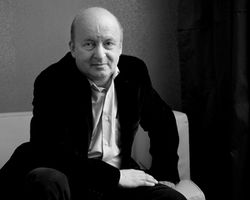Difference between revisions of "Raskatov, Alexander"
| (3 intermediate revisions by the same user not shown) | |||
| Line 15: | Line 15: | ||
-------------------------------------------- | -------------------------------------------- | ||
| − | + | Alexander Raskatov was born on 9 March 1954 in Moskow and finished his studies at the local conservatotry in 1978. In 1990 he joined the Union Contemporary Music Russia. His major interests are focussing mainly vocal and instrumental chamber music and symphonic sounds. His outstanding skills find their output in his vivid fantasy and emotional language which he combines with distinct and elaborated structural processes. Alfred Schnittke was seeing in im "one of the most interesting composers of his generation". | |
| − | + | The musical and biographical roots Alexander Raskatov has in the Russian-Sowjet culture are widely spread and grow hidden under the shivering surface of his music. The composer himself refers to his dialogue with Slawonic folk music like he learned to know in his early years with the Don-Cossacks. He found reminders of a Russian "Pro-Culture" which he followed in the tradition of Jewish music and the chants of the Russian-orthodox liturgy. | |
| − | + | In 1990 Raskatov was appointed "composer in residence" at Stetson University and in 1998 in Lockenhaus. He was awarded numerous prizes and fellowships, e.g. in 1994 an invitation by foundations Arno Schmidt and later M. P. Belaiev for staying in Germany, in 1996 and 1998 a fellowship of the French-American foundation "la Napoule", was invited in 1997 to join the master couse of the "Cité de la musique" in Paris and in 1998 he received the composition award of the Salzburger Osterfestspiele, just to name a few. Raskatov received commissions for new works by the most renowned artists of the world such as Gidon Kremer, Sabine Meyer Wind Ensemble, Netherlands Blazers Ensemble, Hilliard Ensemble and the Schönberg Ensemble.<ref>https://en.schott-music.com/shop/autoren/alexander-raskatov</ref> | |
| − | |||
| − | |||
| − | |||
| − | |||
| − | |||
| − | |||
| − | |||
| − | |||
| − | |||
| − | |||
| − | |||
| − | |||
| − | |||
| − | |||
| − | |||
<!--== Books for Percussion == | <!--== Books for Percussion == | ||
| Line 58: | Line 43: | ||
<!-- {{DEFAULTSORT: Lastname, Firstname}} --> | <!-- {{DEFAULTSORT: Lastname, Firstname}} --> | ||
[[Category:Composers]] | [[Category:Composers]] | ||
| − | + | [[Category:Russian Composers]] | |
| − | + | [[Category:Percussion Ensemble]] | |
| + | [[Category:Solo Percussion]] | ||
| + | [[Category:Percussion Quintet]] | ||
| + | [[Category:Percussion (5)]] | ||
| + | [[Category:Percussion Sextet]] | ||
| + | [[Category:Percussion (6)]] | ||
| + | [[Category:Concerto]] | ||
| + | [[Category:Percussion Concerto]] | ||
| + | [[Category:Multiple Percussion]] | ||
| + | [[Category:Marimba]] | ||
| + | [[Category:Organ]] | ||
| + | [[Category:Orchestra]] | ||
| + | [[Category:with Tape]] | ||
| + | [[Category:Electronics]] | ||
| + | [[Category:Amplified]] | ||
<!-- Don't forget to add categories, literature, instruments, history, pedagogy, sticks, etc. Also delete the Template category. To see what categories are available, see: http://www.tekpercussion.com/Special:Categories --> | <!-- Don't forget to add categories, literature, instruments, history, pedagogy, sticks, etc. Also delete the Template category. To see what categories are available, see: http://www.tekpercussion.com/Special:Categories --> | ||
Latest revision as of 01:20, 10 July 2018
Biography
Born: 1953
Country: Moscow, Russia
Studies: Moscow conservatory
Teachers: Albert Leman; Tikhon Khrennikov
Website:
Alexander Raskatov was born on 9 March 1954 in Moskow and finished his studies at the local conservatotry in 1978. In 1990 he joined the Union Contemporary Music Russia. His major interests are focussing mainly vocal and instrumental chamber music and symphonic sounds. His outstanding skills find their output in his vivid fantasy and emotional language which he combines with distinct and elaborated structural processes. Alfred Schnittke was seeing in im "one of the most interesting composers of his generation".
The musical and biographical roots Alexander Raskatov has in the Russian-Sowjet culture are widely spread and grow hidden under the shivering surface of his music. The composer himself refers to his dialogue with Slawonic folk music like he learned to know in his early years with the Don-Cossacks. He found reminders of a Russian "Pro-Culture" which he followed in the tradition of Jewish music and the chants of the Russian-orthodox liturgy.
In 1990 Raskatov was appointed "composer in residence" at Stetson University and in 1998 in Lockenhaus. He was awarded numerous prizes and fellowships, e.g. in 1994 an invitation by foundations Arno Schmidt and later M. P. Belaiev for staying in Germany, in 1996 and 1998 a fellowship of the French-American foundation "la Napoule", was invited in 1997 to join the master couse of the "Cité de la musique" in Paris and in 1998 he received the composition award of the Salzburger Osterfestspiele, just to name a few. Raskatov received commissions for new works by the most renowned artists of the world such as Gidon Kremer, Sabine Meyer Wind Ensemble, Netherlands Blazers Ensemble, Hilliard Ensemble and the Schönberg Ensemble.[1]
Works for Percussion
Abgesang - Marimba (Marimba Player Sings)
Commentary on a vision - Multiple Percussion, Orchestra
Illusions - Percussion Sextet
Madrigal in Metal - Percussion Quintet
Remembrance of an Alpine Rose - Percussion Sextet, a musical box (barrel organ), and tape
References
